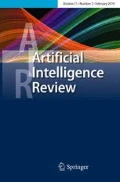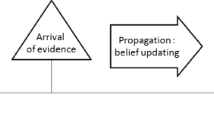Abstract
This paper presents a non-prioritized belief change operator, designed specifically for incorporating new information from many heterogeneous sources in an uncertain environment. We take into account that sources may be untrustworthy and provide a principled method for dealing with the reception of contradictory information. We specify a novel Data-Oriented Belief Revision Operator, that uses a trust model, subjective logic, and a preference-based argumentation framework to evaluate novel information and change the agent’s belief set accordingly. We apply this belief change operator in a collaborative traffic scenario, where we show that (1) some form of trust-based non-prioritized belief change operator is necessary, and (2) in a direct comparison between our operator and a previous proposition, our operator performs at least as well in all scenarios, and significantly better in some.


Similar content being viewed by others
Notes
The ODD protocol was designed to standardize the method for describing Agent-Based Models in order to facilitate understanding and duplication, and thus solves a number of the problems existing in simply sharing a code base.
References
Adler TB, Chatterjee K, De Alfaro L, Faella M, Pye I, and Raman V (2008) Assigning trust to wikipedia content. In: Proceedings of the 4th international symposium on Wikis, page 26, Porto, Portugal, ACM
Alchourrón CE, Gärdenfors P, Makinson D (1985) On the logic of theory change: partial meet contraction and revision functios. J Symb Log 50(2):510–530
Amgoud L and Cayrol C (1998) On the acceptability of arguments in preference-based argumentation. In: UAI’98, pages 1–7, Madison, USA, Morgan Kauffman Publishers
Amgoud L, Vesic S (2014) Rich preference-based argumentation frameworks. Int J Approx Reason 55(2):585–606
Ben Sinai M, Partush N, Yadid S, and Yahav E (2014) Exploting social navigation. arXiv preprint arXiv:1410.0151
Bench-Capon T (2003) Persuasion in practical argument using value-based argumentation frameworks. J Log Comput 13(3):429–448
Burnett C, Norman TJ, and Sycara K (2010) Bootstrapping trust evaluations through stereotypes. In: Proceedings of AAMAS’10, pages 241–248, Toronto, Canada, IFAAMAS
Caminada M (2006) On the issue of reinstatement in argumentation. In :10th European conference on logics in artificial intelligence (JELIA’06), pages 111–123, Liverpool, UK, Springer
Dubois D, Prade H (1988) Representation and combination of uncertainty with belief functions and possibility measures. Comput Intell 4(3):244–264
Dung PM (1995) On the acceptability of arguments and its fundamental role in nonmonotonoic reasoning, logic programming and n-person games. Artif Intell 77(2):321–357
Dunne PE, Wooldridge M (2009) Complexity of abstract argumentation. In: Rahwan I, Simari GR (eds) Argumentation in artificial intelligence. Springer, Berlin, pp 85–104
Eck A and Soh L-K (2010) Dynamic facts in large team information sharing. In: Proceedings of AAMAS’13, pages 1217–1218, Saint Paul, USA, IFAAMAS
Falappa MA, Kern-Isbender G, Simari GR (2009) Belief revision and argumentation theory. In: Rahwan I, Simari GR (eds) Argumentation in artificial intelligence. Springer, Berlin, pp 341–360
Falappa MA, García AJ, Kern-Isbender G, Simari GR (2011) On the evolving relation between belief revision and argumentation. Knowl Eng Rev 26(1):35–43
Farah MB, Mercier D, Lefèvre É, Delmotte F (2013) A high-level application using belief functions for exchanging and managing uncertain events on the road in vehicular ad hoc networks. Annal Telecommun - annales des télécommunications 69(3):185–199
Greenshields BD (1935) A study of traffic capacity. In: Proceedings of the 14th annual meeting of the highway research board, pp 448–481
Grimm V, Berger U, Bastiansen F, Eliassen S, Ginot V, Giske J, Goss-Custard J, Grand T, Heinz SK, Huse G et al (2006) A standard protocol for describing individual-based and agent-based models. Ecol Model 198(1):115–126
Hansson SO (1999a) A textbook of belief dynamics: theory change and database updating. Springer, Berlin
Hansson SO (1999b) A survey of non-prioritized belief revision. Erkenntnis 50(2–3):413–427
Huang D, Hong X, Gerla M (2010) Situation-aware trust architecture for vehicular networks. Commun Mag IEEE 48(11):128–135
Jøsang A (2002) The consensus operator for combining beliefs. Artif Intell 141(1):157–170
Jøsang A (2012) Interpretation of fusion and hyper opinions in subjective logic. In: 15th International conference on information fusion, pp 1225–1232, Singapore, IEEE
Koster A, Tettamanzi AGB, Bazzan ALC, and Pereira CdC (2013) Using trust and possibilistic reasoning to deal with untrustworthy communication in vanets. In: 16th IEEE annual conference on intelligent transportation systems, pp 2355–2360, The Hague, The Netherlands, 2013. IEEE
Krümpelmann P, Thimm M, Falappa MA, García AJ, Kern-Isbender G, and Simari GR (2012) Selective revision by deductive argumentation. In: Theory and applications of formal argumentation (TAFA’11), pp 147–162, Barcelona, Spain, Springer
Paglieri F, and Castelfranchi C (2005) Revising beliefs through arguments: Bridging the gap between argumentation and belief revision in MAS. In: Argumentation in multi-agent systems, pp 78–94. Springer
Pereira CdC, Tettamanzi AGB, and Villata S (2011) Changing one’s mind: Erase or rewind? possibilistic belief revision with fuzzy argumentation based on trust. In: IJCAI’11, pp 164–171, Barcelona, Spain, 2011. AAAI Press
Pigozzi G (2015) Belief merging and judgment aggregation. In: Zalta EN (ed) The Stanford Encyclopedia of Philosophy. Fall 2015 edition, 2015. http://plato.stanford.edu/archives/fall2015/entries/belief-merging/
Raya M, Papadimitratos P, Gligor VD, and Hubaux J-P (2008) On data-centric trust establishment in ephemeral ad hoc networks. In: INFOCOM 2008. The 27th Conference on Computer Communications. IEEE. IEEE
Shafer G (1976) A mathematical theory of evidence, vol 1. Princeton University Press, Princeton
Smarandache F and Dezert J (2005) Information fusion based on new proportional conflict redistribution rules. In: 8th International conference on information fusion, vol 2, Philadelphia, USA, IEEE
Souza Md, Koster A, and Bazzan ALC (2015) Technical description of an agent-based model for testing the effect of com-munication, trust and belief revision methods in a collaborative traffic scenario, Available at http://goo.gl/1gx1YA
Tang Y, Cai K, McBurney P, Sklar E, Parsons S (2012) Using argumentation to reason about trust and belief. J Log Comput 22(5):979–1018
Wilenski U (1999) Netlogo, http://ccl.northwestern.edu/netlogo Center for connected learning and computer-based modeling, Northwestern University, Evanston, IL, USA
Zhang J (2011) A survey on trust management for vanets. In: Advanced information networking and applications (AINA), 2011 IEEE international conference on, pp 105–112. IEEE
Author information
Authors and Affiliations
Corresponding author
Rights and permissions
About this article
Cite this article
Koster, A., Bazzan, A.L.C. & de Souza, M. Liar liar, pants on fire; or how to use subjective logic and argumentation to evaluate information from untrustworthy sources. Artif Intell Rev 48, 219–235 (2017). https://doi.org/10.1007/s10462-016-9499-1
Published:
Issue Date:
DOI: https://doi.org/10.1007/s10462-016-9499-1




